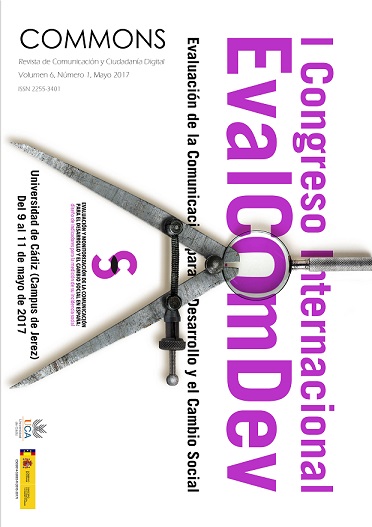An ethnographic approach to low-income youth’s engagement in Communication for Social Change

Info
Abstract
This article presents an ethnographic approach to how low-income Brazilians of impoverished urban areas have engaged in community journalism and media activism. Exploring empirical materials collected during a seven-year research process (2009-2016), the article has two main objectives. One is to analyze how low-income youth reflect on their own processes of engagement in communication for social change (CFSC). Another objective is to demonstrate how ethnography can provide in-depth analyses of trajectories and initiatives in CFSC. The article primarily focuses on retrospective accounts of young adults who had participated in media-educational projects by non-governmental organizations (NGOs) and subsequently became active agents of change in, through and about media. The analysis of these accounts indicates how the participation in NGO projects characterize actions for self-development. It also demonstrates how interactions among participants – not necessarily anticipated by NGOs – are crucial for low-income youth to engage in activist media and journalism in peripheral Rio de Janeiro. The article ends with a reflection about how ethnography is a useful method to add in-depth qualitative layers to the evaluation of CFSC initiatives.
Keywords
Downloads
How to Cite
License
Authors who have published with this journal accept the following terms:
- Authors shall retain their copyright and guarantee the journal the right of first publication of their work, which shall simultaneously be subject to the Creative Commons 3.0 Recognition License, which allows third parties to share the work as long as its author and first publication are indicated in this journal.
- Authors may adopt other non-exclusive licensing agreements for the distribution of the published version of the work (e.g., depositing it in an institutional telematic archive or publishing it in a monographic volume) provided that the initial publication in this journal is indicated.
- Authors are permitted and encouraged to disseminate their work via the Internet (e.g., in institutional telematic archives or on their website) before and during the submission process, which may lead to interesting exchanges and increased citations of the published work. (See The Effect of Open Access).
References
Bendell, J. (2006). NGLS development dossier: Debating NGO accountability. New York/Geneva: UN Non-Governmental Liaison Service.
Blumer, H. (1969). Symbolic interactionism: Perspective and method. California: University of California Press.
Cornwall, A., & Eade, D. (Eds.). (2010). Deconstructing development discourse: Buzzwords and fuzzwords. Warwickshire/Oxford: Practical Action/Oxfam.
Custódio, L. (2016). Favela media activism. political trajectories of low-income brazilian youth. Tampere (Finland): Tampere University Press.
Eade, D. (Ed.). (2000). Development, NGOs and civil society. Oxford: Oxfam.
Edwards, M., & Hulme, D. (Eds.). (1992). Making a difference: NGOs and development in a changing world. London: Earthscan.
Edwards, M., & Hulme, D. (Eds.). (1997). NGOs, states and donors: Too close for comfort? London: McMillan Press.
Freire, P. (1987). Education for critical consciousness. New York: Continuum.
Hemer, O., & Tufte, T. (2012). ComDev in the mediatized world. Nordicom Review, 33(Special Issue), 229-238.
Hilhorst, D. (2003). The real world of NGOs: Discourses, diversity and development. London: Zed Books.
Kilby, P. (2006). Accountability for empowerment: Dilemmas facing non-governmental organizations. World Development, 34(6), 951-960.
Lewis, D., & Opoku-Mensah, P. (2006). Moving forward research agendas on international NGOs: Theory, agency and context. Journal of International
Development, 18(5), 665-675.
Perlman, J. (2010). Favela: Four decades of living on the edge in Rio de Janeiro. New York: Oxford University Press.
Rodriguez, C., Ferron, B., & Shamas, K. (2014). Four challenges in the field of alternative, radical and citizens' media research. Media, Culture & Society, 36(2), 150-166.
Sartoretto, P. (2016). Mobilization as communication. A latin american contribution to the study of social movements. Commons, 5(2), 95-116.
Snow, D. A. (2001). Extending and broadening blumer's conceptualization of symbolic interactionism. Symbolic Interaction, 24(3), 367-377.
Thomas, J. (1993). Doing critical ethnography. Thousand Oaks (CA): Sage.
Thomas, P. (2015). Communication for social change, making theory count. Nordicom Review, 36(Special Issue), 71-78.
White, S. C. (2000). Depoliticizing development: The uses and abuses of participation. In D. Eade (Ed.), Development, NGOs and civil society (pp. 142-155). Oxford: Oxfam.
White, R. A. (2004). Is ‘Empowerment’ the answer?: Current theory and research on development communication. Gazette, 66(1), 7-24.
Willetts, P. (2011). Non-governmental organizations in world politics: The construction of global governance. Oxford: Routledge.


